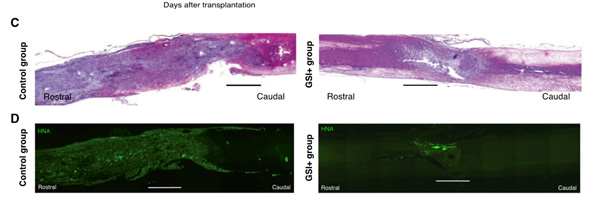Research Highlights
Vol.9, March 2017
Simple pre-treatment ensures safe neural cell transplants
Stem cell and progenitor cell neural studies have shown great promise for cell-based treatments of central nervous system disorders. However while transplants have demonstrated initial success in retrieving motor function, tumor-like overgrowth of the cells was found to follow so that the motor function began to deteriorate again. Now Masaya Nakamura, Hideyuki Okano and their colleagues at Keio University have demonstrated a simple treatment that can prevent these tumors forming.
Like stem cells, progenitor cells have a tendency to develop into more specialised cells. The neural stem/progenitor cells (NS/PCs) investigated can differentiate into three types of neural cells - neurons, astrocytes, and oligodendrocytes.
The researchers reasoned that they needed to either remove immature cell transplants or induce them to mature into specialised neural cells to prevent tumors developing. Since Notch signalling is known to control NS/PC induction and can be inhibited with a γ-secretase inhibitor, the researchers investigated the effects of γ-secretase inhibitor on the proliferation and differentiation of human induced pluripotent stem cell NS/PCs (hiPSC-NS/SCs) both in vitro, and in vivo.
The researchers used two cell lines known to develop tumors following implants and found that pre-treatment with γ-secretase inhibitor led to a reduced proliferation of the cells in vitro and in vivo, preventing tumors forming. They also found that while cell numbers were reduced for treated NS/PCs, the number of mature neural cells was increased. The researchers injured the spinal cord of mice and then transplanted NS/PCs into them and found that gait and recovered motor function was sustained in the mice transplanted with treated cells, whereas it soon deteriorated for mice transplanted with untreated control NS/PCs.
In their report of the results the researchers conclude, “Pre-treatment of hiPSC-NS/PCs with γ-secretase inhibitor can improve the safety of hiPSC-NS/PC transplantation therapy for spinal cord injury.”
publication and Affiliations
Toshiki Okubo1,2,Akio Iwanami1, Jun Kohyama2, Go Itakura2, Soya Kawabata1, Yuichiro Nishiyama1, Keiko Sugai1, Masahiro Ozaki1,2, Tsuyoshi Iida1,2, Kohei Matsubayashi1,2, Morio Matsumoto1, Masaya Nakamura1,*and Hideyuki Okano2,* Pretreatment with a γ-secretase inhibitor prevents tumor-like overgrowth in human iPSC-derived transplants for spinal cord injury Stem Cell Reports 7 649–663 (2016).
- Department of Orthopaedic Surgery
- Department of Physiology, Keio University School of Medicine, 35 Shinanomachi, Shinjuku-ku, Tokyo 160-8582, Japan *corresponding author, e-mail address: masa@a8.keio.jp, hidokano@a2.keio.jp
Figure:







